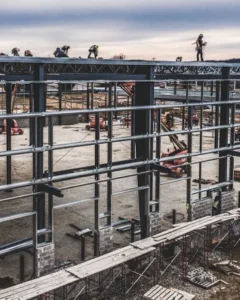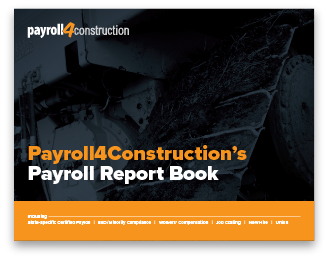Michigan Prevailing Wage Laws: A Complete Guide for Contractors
Overview of Act 10 of 2023
Michigan's Act 10 of 2023 reinstated prevailing wage requirements on state-funded construction projects, requiring contractors to pay standardized wages that match local labor agreements for similar work.
For any construction company impacted by this law, Payroll4Construction is here. As a complete payroll service, Payroll4Construction is built to keep contractors compliant with certified payroll reporting and prevailing wage rate determinations.
Keep reading to learn more about Michigan's prevailing wage laws and how we can help you.
What is Prevailing Wage in Michigan?
Michigan requires contractors in the construction industry to pay prevailing wages on state-funded projects. This includes government buildings, public school projects and other public works. Under this law, construction workers must receive minimum hourly wages and fringe benefits based on local standards for similar work within Michigan's state lines.
Don’t Let Prevailing Wage Compliance
Slow Down Your BusinessPrevailing Wage Rate Determination
Setting Initial Rates
Before the bidding process begins, the state commissioner has several crucial responsibilities related to employment compensation. These responsibilities ensure transparency and fairness throughout the contracting process.
The state commissioner must:
- Determine appropriate employment compensation, including hourly rates and benefit rates, before the bidding process
- Include these rates in all project specifications
- Print rates directly on bidding forms
- Verify and update rates if no contract is awarded within 90 days
Rate Calculation Method
The commissioner follows a structured analytical approach to determine fair and accurate compensation rates. They establish rates by analyzing:
- Comparable construction projects in the project location
- Local collective agreements between employees and employers
- Similar locations' rates if local agreements aren't available
- Public meeting input when necessary
Prevailing Wage Requirements
Prevailing wage laws establish minimum compensation standards for workers on public projects. These requirements ensure fair labor practices and create a level playing field for all contractors bidding on government work.
- Contractor

Contractors bear significant responsibility for ensuring project compliance with prevailing wage regulations. These requirements apply from the bidding process through project completion and include:
- Maintaining valid state project registration
- Submitting registration with all bids
- Ensuring all subcontractors hired for the project are properly registered with the state
- Adding subcontractor registration documentation to the bids
How to Submit Prevailing Wage Proof
Michigan's prevailing wage law requires contractors and subcontractors to register with the state before participating in public works projects.
This registration process involves comprehensive disclosure of business information, ensuring transparency and accountability.
Information needed in the registration process includes:
- Business name and address
- Contact information
- Business structure details
- Names and addresses of financial stakeholders
- Tax ID and unemployment insurance ID
- Prevailing wage compliance documentation
- Required licenses and certificates
In essence, contractors need certified payroll records and evidence of proper wage payments from previous public projects. Contractors with no prior prevailing wage project experience must acknowledge they understand the requirements.
This registration must be completed before bidding on prevailing wage projects and maintained throughout project execution.
Contractors with previous prevailing wage project history must provide documentation demonstrating their compliance record. Lack of prior experience does not disqualify new contractors from registration.
Compliance, Enforcement and Consequences
The prevailing wage system relies on robust compliance mechanisms and meaningful penalties to ensure all parties adhere to established standards. These measures protect workers' rights, ensuring compliance with wage standards while maintaining the integrity of public projects.
Wage Payment Rules
Prevailing wage laws establish minimum compensation requirements that cannot be circumvented. This ensures workers receive fair pay for their labor on public projects.
The rules surrounding wage payment include:
- Workers must receive local prevailing rates for their work type
- Rates include both actual wages and employee benefits
- Rates are based on local union agreements
- Employers cannot pay below these rates, even with worker consent
Violation Consequences
Significant operational and financial repercussions await contractors who fail to comply with prevailing wage requirements, potentially jeopardizing their entire business.
Construction businesses are at risk of penalties, including:
- Immediate work stoppage
- Written notification to the non-compliant contractor and insurer
- Project reassignment to a different contractor
- Potential ban from future construction contracts
- Financial responsibility for additional costs
Prevailing Wage Whistleblower Protections
Michigan's prevailing wage law includes anti-retaliation provisions specifically designed to protect workers who report violations of prevailing wage requirements or certified payroll discrepancies.
In essence, the law protects workers who submit complaints for violations
Employees are protected from retaliation when reporting prevailing wage violations:
- Protection from termination
- Protection from disciplinary action
- Protection from discrimination
- Protection from threats
These protections apply specifically to matters involving prevailing wage compliance. They allow workers to safely report underpayment, misclassification or certified payroll record falsification without fear of employer retaliation.
Penalties
The legal framework includes substantial financial penalties and establishes clear liability structures to encourage compliance.
Financial consequences include:
- Fines up to $5,000 for violations
- Enforcement by County Prosecutor or State Attorney General
- Joint liability between contractors and subcontractors
- Full penalty payment responsibility
How Payroll4Construction Helps You Stay Compliant
Payroll4Construction is a construction payroll service that specializes in helping contractors and construction companies navigate the complex wage regulations of the Davis-Bacon Act
These time-saving services reduce administrative hours spent on complex wage calculations and paperwork. In turn, this gives the team peace of mind knowing that prevailing wage obligations are being handled correctly.
Prevailing Wage Exceptions
Most state-funded construction projects must adhere to local prevailing wage laws. However, certain exemptions exist under specific circumstances.
These exemptions don't release contractors from fair wage obligations. Instead, the exemptions allow them to follow alternative regulatory frameworks that still maintain worker protections and compensation standards.
State-funded projects may be exempt from state-specific prevailing wage requirements if they:
Follow the federal Davis-Bacon Act of 1931 and its prevailing wage rules because the job is federally funded in the state of Michigan.
- The Davis-Bacon Act establishes its own prevailing wage determination system
- Contractors must still maintain detailed, accurate records for payroll
- Federal wage classifications may differ from state calculations but maintain worker protections
- Compliance with federal standards requires the same rigorous documentation and enforcement
Have union-level wages that meet or exceed local prevailing wages.
- Collective bargaining agreements must be formally verified
- Wage and benefit rates under these agreements must be demonstrably equal to or higher than prevailing rates
- All documentation requirements still apply
- Workers retain the same rights and protections as under standard prevailing wage rules
In both cases, contractors remain responsible for fair wage compliance. They're simply following an alternative set of standards that provide equivalent worker protections to the standard state prevailing wage system.



